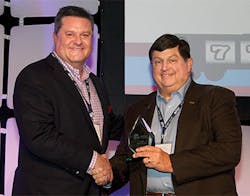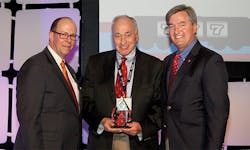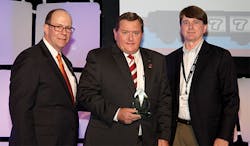Safety captures the spotlight during NTTC’s 66th Annual Conference
SAFETY took center stage during National Tank Truck Carriers’ 66th Annual Conference April 27-29 in Las Vegas, Nevada.
The association opened its conference proceedings with the inaugural presentation of the William A Usher Sr Professional Tank Truck Driver of the Year award. James Starr, a 42-year trucking veteran with Groendyke Transport Inc, was the inaugural winner of the award and was selected from a group of eight champion tank truck drivers.
During more than four decades of truck driving, Starr accumulated 3,498,124 accident-free miles while behind the wheel of a tanker rig. In addition to his duties as a certified driver instructor, Starr was a three-time winner of Groendyke Transport’s President’s Club award and was a winner of the 1987 Terminal Efficiency Award.
“Grand Champion James Starr represents the constant vigilance and dedication to safety that is embodied in the NTTC mission statement, said Jim Shaeffer, NTTC executive committee chairman. “All eight finalists are authentic safety experts and represent the very best of our industry. I had the privilege to meet Jim Starr earlier this year, and I am confident that he will be a tremendous safety ambassador for the NTTC.”
During his acceptance, Starr said it was truly inspirational to be standing on a stage with his fellow finalists. “I’m glad I met all of you,” he said. “I love this industry and the importance it places on safety.”
Strong advocate
A strong advocate of the new Professional Driver of the Year award, NTTC’s new chairman Dean Kaplan was heavily involved in the program. A key emphasis of his term as 2014-2015 chairman will be to keep the emphasis on the importance of tank truck drivers and all they bring to the industry in terms of safety and professionalism.
Following the Professional Driver of the Year award, Captain Chesley B “Sully” Sullenberger III discussed safety from the perspective of an airline pilot. He described in detail the events of January 15, 2009 that became known as the “Miracle on the Hudson.”
Sullenberger was the pilot in command of US Airways flight 1549, which struck a flock of Canada geese during initial climb out following takeoff from LaGuardia Airport in New York City, lost power, and ditched in the Hudson River with no loss of life. The event was described by a National Transportation Safety Board member as “the most successful ditching in aviation history.”
Sullenberger told his NTTC audience that safety must be a team activity, and that companies must be willing to change the way they do things before change is forced on them. He stressed the importance of technology, such as electronic driver logs. He talked about the importance of situational awareness for drivers out on the road.
Tank fleet safety was in the spotlight when Superior Carriers, a division of Superior Bulk Logistics, was honored with its first NTTC Outstanding Safety Performance Trophy. Superior Carriers earned the award with an accident frequency of 0.382 accidents per million miles in the 40-90 million miles class of the 2013 Competitive Safety Contest. Superior also earned a Grand Award in the 2013 Personnel Safety Contest with a frequency of 0.91.
Driver shortage
One of the strongest arguments for keeping drivers safe came from Bob Costello, chief economist for the American Trucking Associations. He pointed out that the growing driver shortage is playing a big role in capacity shortages.
Costello said the trucking industry as a whole will need nearly 100,000 more drivers per year over the next 10 years. Growing demand comes from four key factors: Industry growth (36%), retirements (37%), voluntary non-retirement departures (11%), and non-voluntary departures (16%).
Driver turnover in 2013 for large fleets was close to 100% and was in the 80% range for smaller fleets. Company drivers accounted for much of the turnover, but the owner-operator supply also continues to fall. The independent contractor supply is projected to shrink around 1.6% for large fleets in 2014 and 6.6% for the smaller fleets.
Costello went on to say that tank truck carriers must successfully address the driver shortage if they want to continue growing with the US economy. He added that tank truck carriers continue to outperform the rest of trucking.
Tank truck loads were up roughly 6.6% during 2013, and overall tonnage was up 6.3%. He predicted that tank truck loads should grow by about 5.8% during 2014 despite one of the toughest winters the United States has experienced in a number of years.
Costello went on to say that overall the US economy continues to show signs of improvement despite a dismal weather-affected first quarter. “We expected the economy to slow in the first quarter, but the weather was a significant drag,” he said. “Still, the first quarter should be the weakest of the year.”
He added that gross domestic product (GDP) growth could hit 2.7% during the second quarter before returning to the average of 2.6% for the rest of the year. Costello cited a number of factors for the upbeat forecast on GDP.
Housing starts have been growing steadily and should top the one million mark for the first time since 2007. Chemical output will continue to accelerate over the next two years. Plastics production is expected to grow about 3.4% over the next two years. Paint production grew by a solid 8.9% in 2013 and is expected to remain at higher than average growth levels over the next two years.
US crude oil production, which is up 67% from 2010, should remain strong. US crude oil production should grow by around 8.39 in 2014 and by 9.16% in 2015. “We are on pace to reach an all-time high in crude oil production in the United States,” Costello said.
The United States is now awash in gasoline and diesel refined from domestically produced crude oil, and the volumes are rising. Not surprisingly, refined petroleum exports have risen dramatically. From 2003 to 2013, diesel exports were up 951% and gasoline exports rose 235%.
Phil Byrd Sr, American Trucking Associations chairman and president of Bulldog Highway Express, provided an update on regulatory issues that ATA is working hard to address. He said ATA is addressing the restart issue in the Transportation Appropriations process and is seeking a stay of the new restart rule until the Government Accountability Office (GAO) has time to analyze FMCSA’s Restart Field Study and cost-benefit analysis that accompanied these changes.
“ATA’s professional staff is well aware of the restrictive nature of the new restart provisions and understands the negative productivity impact of these changes,” Byrd said. “We would argue this new regulation is not only burdensome to our industry, it impacts productivity, driver wages, and safety. It puts our trucks and drivers on the highway at times when there is the most congestion. I also think it will impact our driver turnover. As drivers become more frustrated, they’ll find other outlets to make a living. ATA is asking you to write a letter to your Senator or Congressman, saying we have to get Congressional action.”
Addressing sleeper berth rules, Byrd said ATA has joined the Minnesota Trucking Association in developing a comprehensive pilot program application. The goal is to allow a small number of solo and team drivers to operate, in a pilot program, with more flexible sleeper berth rules to develop safety and operational data that can be studied. The long-term goal is to achieve much greater flexibility in the sleeper berth rules than what drivers currently have.
He added that ATA is working on three problems with the Compliance, Safety, Accountability (CSA) program:
• All scores must measure safety performance; some currently do not do so.
• All truck-involved crashes are included.
• The public can be misled by inaccurate scores.
Byrd said Redundant Security Threat Assessments are another top policy/regulatory issue. “Many of you go into sensitive, secured areas,” he said. “This industry needs a single biometric card that will be recognized in sensitive, secured areas. We need this.
“I go in and out of seaports routinely and I’m sure, after making this comment in public, I will get stopped. But my card has been expired since June 2012. I’ve never been stopped. Not once. The program needs some work.”
During the “Right Technology, Right Fit for Your Company” panel discussion, three senior level fleet executives explored the process for selecting fleet management technology that is best suited to a company’s needs. Panelists included Chris Lofgren, Schneider National Inc; Dennis Nash, Kenan Advantage Group; and Greg Hodgen, Groendyke Transport Inc.
When asked where technology comes from in his fleet, Lofgren said: “There’s a saying out there that vision without execution is hallucination. There are a lot of great visions out there and a lot of great technology, but if you can’t get it into execution, there won’t be ROI (return on investment). In our business, those ideas come bottom up and get driven top down. Moving to electronic onboard recorders is top-down thing. Driven decisions, where we can change how drivers interact with our systems … they tend to come bottom up. I don’t think there’s one right answer.”
Electronic on-board recorders are a big deal for all three panelists:
Nash: We started rolling out our technology in 2004. The concern I always had was, would there be enough value created? As we rolled out the system, our emphasis was more getting people prepared. We knew the drivers might be slow to accept it in some cases. Others were more ready to embrace it and take the next step. We primarily focused on getting folks used to using the equipment. It wasn’t so much the electronic logging devices. We were more centered on connecting to our back room, our scheduling, our customer. We had real-time information flowing and really started to get to a point where we weren’t touching paper as much.
Hodgen: We’ve been doing electronic driver logs for seven or eight years. Log violations are almost unheard of in our fleet today. We all know drivers can be creative, but they have to work pretty hard to have a log violation. The system is pretty straightforward and simple.
Our first problem was, we wanted to know what kind of problems it was going to cause. Is this going to be something the workforce can handle, manage, and understand? Or are they going to say no one else is doing it and push back? I had phone calls, postcards. I had people come up to me and say, ‘I can’t believe you’re making us do this.’ But after we got over the initial hump, after they adopted it, they found their lives were better. It forced dispatchers to work more effectively. Prior to that, they said to the drivers, ‘You can do this, right?’ What’s the driver supposed to say? I’ve had drivers today tell me, ‘If you make me give this up (electronic logs), I’m going to quit.’
Lofgren: The other philosophy behind doing this is, there is no right way to do the wrong thing. Double logs are the wrong thing. They just are. I will tell you there were times when something went bad and we found out we weren’t as clean as we wanted to be. You don’t ever want to ask somebody to do something that puts them or somebody else in jeopardy. There was a productivity drop. We saw drivers quit, but we have a policy: If you are an owner-operator and want to drive for us, you’re putting it in. That’s non-negotiable for us.
Dean Kaplan, chief executive officer of K-Limited Carrier Ltd, was elected 2014-2015 chairman.
NTTC’s 67th Annual Conference & Tank Truck Equipment Show will convene in Boston, Massachusetts. The 2015 dates and place are still to be determined.
Three members received lifetime service awards
Harold Sumerford Jr and Peter Sumerford accepted a posthumous lifetime service award on behalf of their father, Harold Sumerford Sr, J



